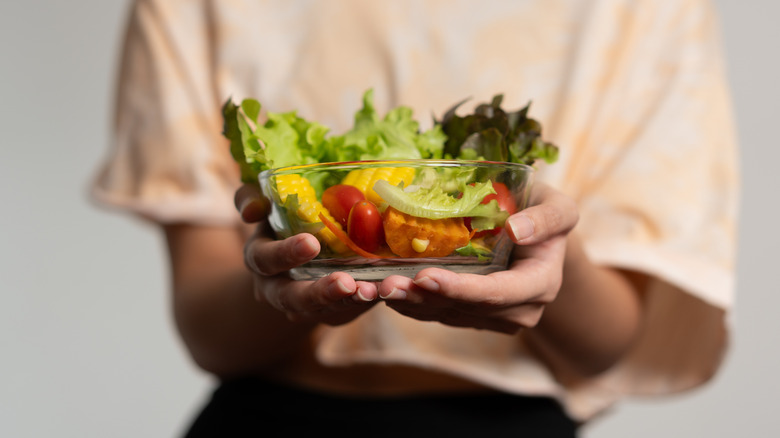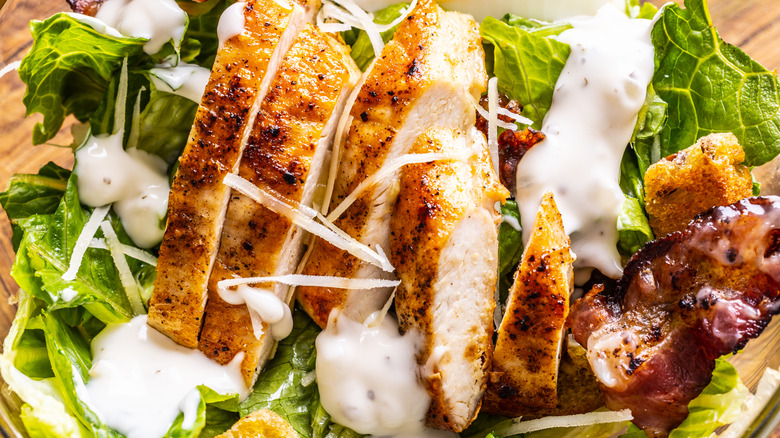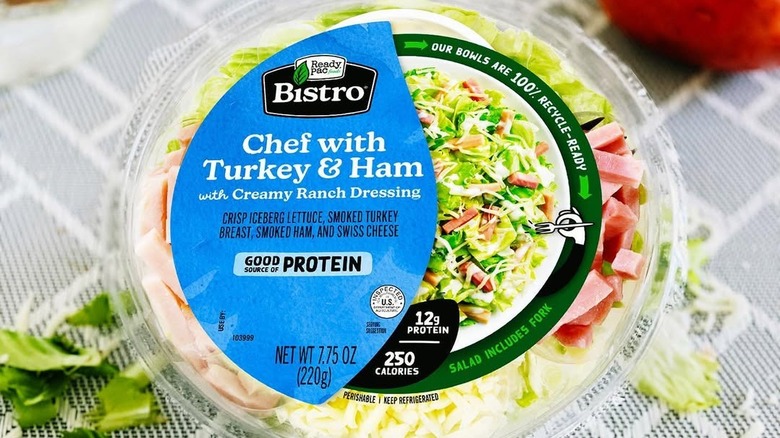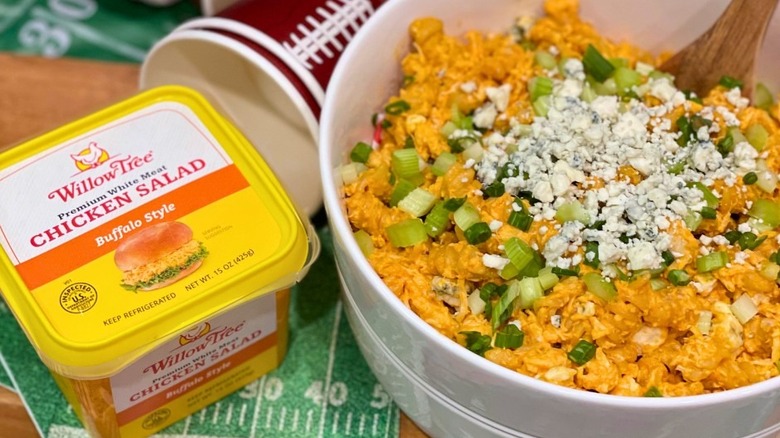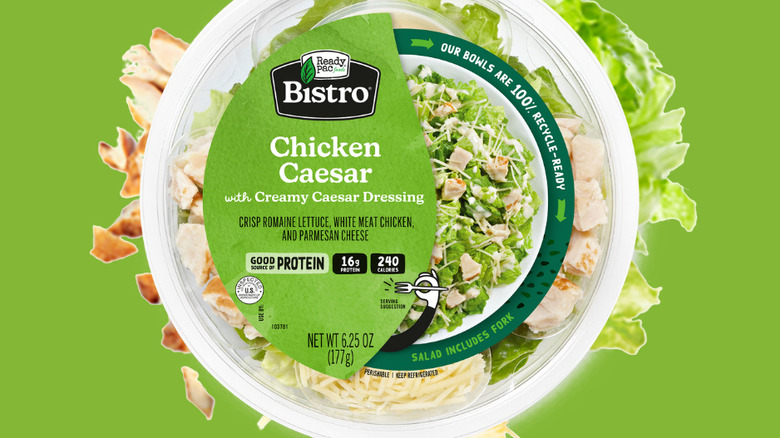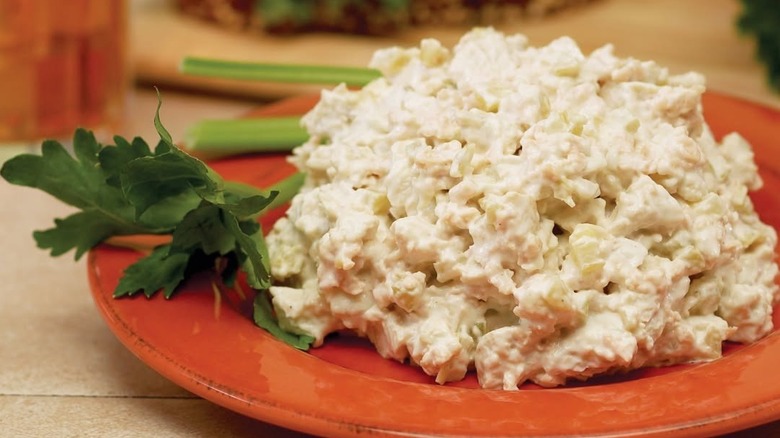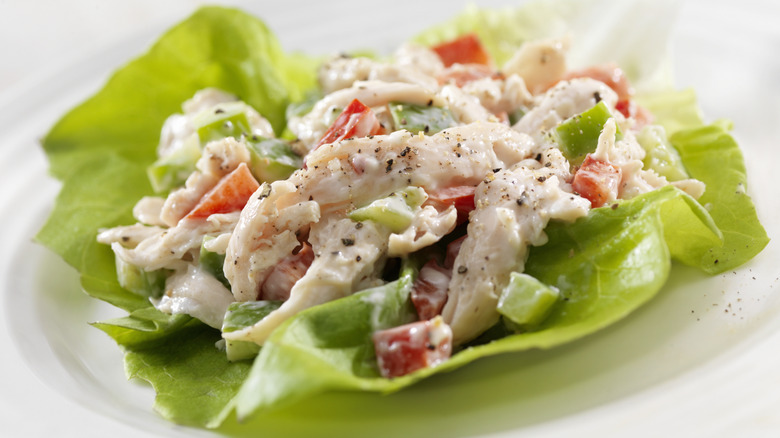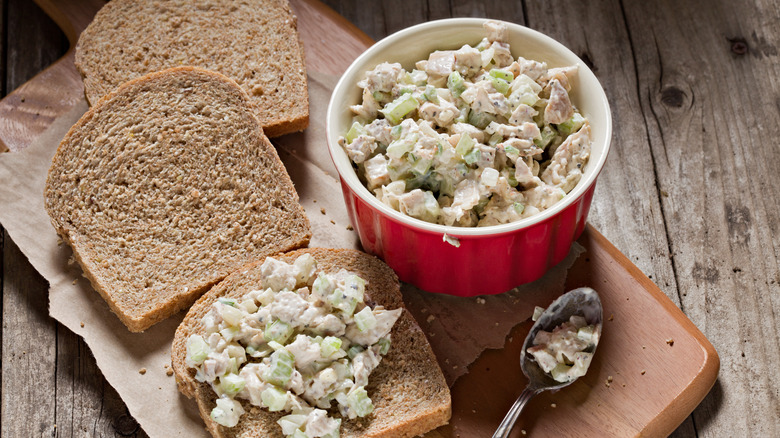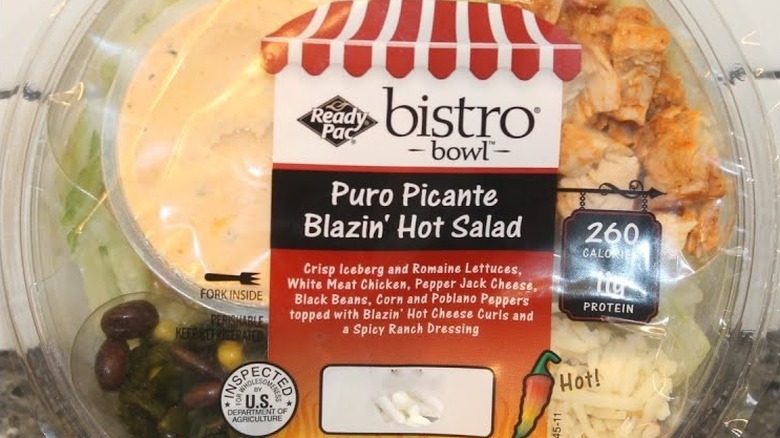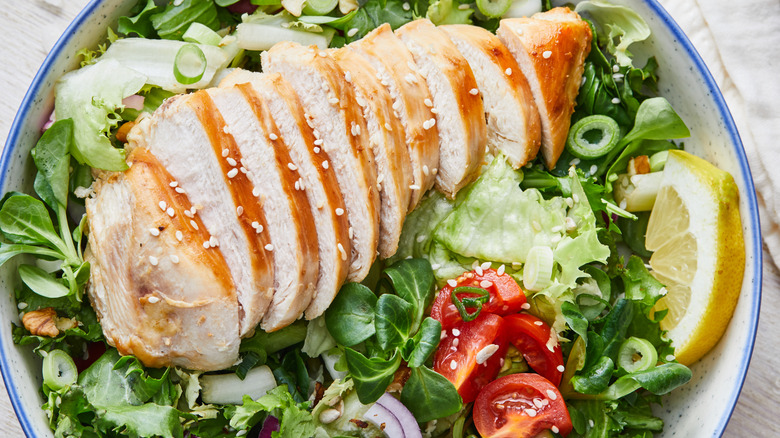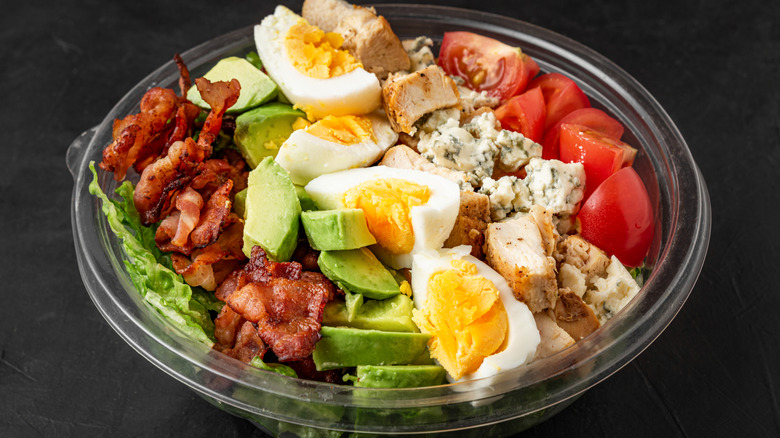Salad Recalls That Affected Millions
Let's be honest, most of us reach for a salad when we're trying to make healthier lunchtime decisions. But often, they're a tasty option, too, especially when they're loaded with crunchy vegetables like lettuce and tomatoes, some form of protein, and a flavorful dressing. One 2022 poll suggests that on average, Americans eat around four salads a week, and more than 60% have salad in their regular meal rotation. Some of these are the leafy green variety, packed with ingredients like spinach and lettuce, but plenty of salads sold in the U.S. revolve around deli meats, like chicken and ham, or cheese, both of which can lead to problems.
Over the years, hundreds of thousands of pounds of salad products have been recalled because they contained foodborne bacteria including listeria, salmonella, and E. coli. Oftentimes, this bacteria is linked to the animal products in salads. But not always. Sometimes, even trying to pick the healthiest salad can come with negative health consequences. Vegetables can harbor dangerous bacteria, too.
Foodborne illness isn't the only reason for recalls — undeclared allergens and even stray plastic have presented problems, too. Luckily, the risk of actually coming to harm from eating a contaminated salad product is low, because they are usually recalled from the market as soon as an issue comes to light — even if they've already been shipped out nationwide. Below, we've rounded up some of the biggest salad recalls in history, some of which affected major retailers, like Kroger and Fareway.
More than 19,900 pounds of Kroger salad bowls recalled due to undeclared wheat allergen (2024)
In March 2024, Taylor Farms Pacific, a California food producer, recalled some 19,900 pounds of salad bowls because they contained wheat that had not been appropriately declared on the label. As wheat is both an allergen and a trigger for the autoimmune condition celiac disease, millions of people across the U.S. rely on correct labeling to keep them safe. Unfortunately, this doesn't always happen. In fact, undeclared allergens are a common cause of recalls in the U.S.
At the time of the Taylor Farms Pacific recall, the salad bowls had already been sent to Kroger stores in 12 states, including Alaska, California, Arizona, Idaho, Nevada, New Mexico, and Utah. There were no reports of illness associated with the undeclared allergen, which was discovered during a routine quality check by Taylor Farms Pacific. People who had already purchased the salad bowls were urged not to consume them, and instead either dispose of them or return them to Kroger for a refund.
This is not the only time Kroger has been caught up in a recall. In 2023, for example, Weis Markets pulled its Brownie Moose Tracks ice cream off the supermarket's shelves due to concerns the product could contain undeclared egg, another major allergen. Also in 2024, Kroger was involved in a Schreiber Foods recall of more than 800,000 units of cream cheese due to fears they could contain salmonella, a dangerous strain of foodborne bacteria.
More than 222,000 pounds of salad recalled due to undeclared anchovies allergen (2021)
Wheat isn't the only allergen that can sneak into salad products. Milk, eggs, nuts, and fish can also find their way into food products unknowingly. In 2021, Ready Pac Foods issued a recall for about 222,915 pounds of salad products, including products from its Bistro Chef range, as they contained undeclared anchovies. The contamination was linked to a mislabeled shipment from the brand's salad dressing supplier — Caesar dressing with anchovies had been labeled as ranch.
Fish allergies are common in the U.S. In fact, around 1% of the population are thought to be allergic to finned fish, which includes anchovies, as well as other species like cod, haddock, and hake. Fish allergies are not linked to shellfish allergies, which also impact a number of Americans. People with shellfish allergies are more sensitive to foods like crab, prawns, and shrimp, although experts recommend that people with fish or shellfish allergies take care around all seafood products or foods with traces of seafood.
Like most allergies, fish allergies, which tend to develop in adulthood, vary in severity. For some, eating a contaminated product may result in a rash, stomach cramps, congestion, or a headache. For others, it could result in anaphylaxis, which is life-threatening. There were no reports of allergic reactions linked with the Ready Pac Foods recall. Again, consumers were urged to either throw away the salads or return them to the store they bought them from.
Willow Tree Poultry Farms recalled more than 52,000 pounds of chicken salad over fears they contained hard plastic (2021)
In 2021, some consumers got a surprise when they opened their chicken salad from Willow Tree and found stray pieces of hard plastic inside. As a result of consumer complaints, the brand, which is based in Massachusetts, issued a recall for more than 52,000 pounds of its premium chicken salad products, including White Meat Buffalo Chicken Salad, White Meat Cranberry Walnut Chicken Salad, and Classic Chicken Salad. At the time of the recall, the chicken salads had already been shipped to stores in nine states. Luckily, there were no reports of injuries or illnesses associated with the hard plastic, which could have lead to choking, dental problems, or internal injuries if accidentally consumed.
Unfortunately, while finding pieces of plastic in your food is uncommon, it is not unheard of. In 2023, for example, Kraft recalled more than 83,800 cases of its American cheese slices over fears they contained pieces of plastic packaging. In 2015, Subway customers also found pieces of white plastic in their chicken sandwiches, which resulted in a recall of more than 34,000 pounds of chicken breast from the fast food chain.
Plastic isn't the only foreign object that can find its way into food. Bugs, rocks, and pieces of metal have also caused multiple recalls in the past. In 2022, for example, meat giant Tyson recalled almost 100,000 pounds of ground beef because they contained a "mirror-like material."
More than 75,200 pounds of salad products recalled over fears of E.coli contamination (2019)
In 2019, Ready Pac Foods was once again caught up in a recall. This time, it was issued by one of its producers, the New Jersey company Missa Bay, due to fears that some of the lettuce used in one of Ready Pac Foods' salad products was contaminated with E.coli bacteria.
More than 75,200 pounds of the Ready Pac Foods' chicken Caesar salad ended up being recalled after inspectors linked it with an ongoing outbreak of E.coli. Eating foods contaminated with E.coli bacteria can lead to incredibly unpleasant symptoms like bloody diarrhea, vomiting, and nausea. In rare cases, the bacteria can even be fatal, as it can lead to kidney failure. Anyone who had already purchased the Ready Pac Foods salad at the time of the recall was urged to not consume it and instead dispose of it immediately.
Unfortunately, lettuce is one of the most common foods to be contaminated with E.coli. In 2022, for example, Wendy's recalled the lettuce used in its popular burgers from multiple locations due to fears it was making people sick. In 2018, Chick-Fil-A also recalled lettuce from its restaurants due to E.coli contamination. Lettuce, as well as other vegetables like onions and spinach, are usually vulnerable to bacteria due to runoff from nearby animal farms. The runoff, which contains excrement, leaks into the soil where it is being grown, leading to potentially dangerous contamination.
Ron's Home Style Foods recalled more than 6,900 pounds of chicken salad over listeria concerns (2018)
E.coli is just one of many strains of dangerous bacteria that can make its way into the food supply. Every year, around 1,600 Americans are also infected with listeria, which can lead to a serious illness called listeriosis. It's rare, but, again, the symptoms of listeriosis are incredibly unpleasant. Like E.coli infection, they include diarrhea, nausea, and vomiting, as well as a fever and chills. In some cases, listeriosis can be fatal — it's particularly dangerous for pregnant women, infants, the elderly, and anyone with a compromised immune system.
In 2018, Ron's Home Style Foods became concerned about infecting people with listeria after a routine review from the USDA's Food Safety and Inspection Service (FSIS) found traces of the bacteria in its chicken salad products. As a result, the Texas company issued a recall for more than 6,900 pounds of product, including its Cranberry Pecan White Meat Chicken Salad, its Chicken Salad Supreme, and its Honey Pecan White Meat Chicken Salad.
Luckily, there were no reports of listeria infection associated with the recall. As usual, anyone who had already purchased the products was urged not to consume them and to throw them away or return them to the store they purchased them from.
More than 20,600 pounds of Fareway chicken salads recalled due to possible salmonella (2018)
Salmonella is another common foodborne bacteria. In fact, it infects around 1.35 million Americans every year — which is significantly more than listeria. Experts believe that the real number could even be higher, as most people with food poisoning will not report it to a doctor. Salmonella infections also often cause symptoms like diarrhea and vomiting, but, again, they can be serious and even fatal for vulnerable individuals.
Salmonella is often found in poultry products. This was the case in 2018, when Iowa food supplier Triple T Specialty Meats recalled more than 20,600 pounds of chicken salad that had been sold in Fareway grocery stores. During an investigation, the FSIS linked the deli salad to an outbreak of salmonella infections in Iowa, although the products had also been shipped to Illinois, Minnesota, Nebraska, and South Dakota.
Triple T Specialty Meats isn't alone. In 2024, more than 10,800 packs of eggs were recalled from Costco stores due to contamination with the bacteria. In the same year, 3 million eggs were recalled from stores in France over salmonella fears. In 2011, meat giant Cargill was forced to issues a massive recall of 36 million pounds of turkey meat because of the bacteria. Sadly, in this case, a man died as a result of eating the contaminated product, while at least 136 people in 34 states were sickened by the outbreak.
Packer Avenue Foods recalled more than 9,600 pounds of chicken salad due to undeclared milk (2017)
In 2017, undeclared allergens were the cause of another recall. This time, Pennsylvania company Packer Avenue Foods had to recall more than 9,600 pounds of chicken salad from wholesalers in Delaware, Maryland, New Jersey, Pennsylvania, and Virginia because they could have contained milk that had not been declared on the label. The issue was due to a mix up at one of Packer Avenue Foods' ingredient suppliers.
Milk is a serious allergen. Usually, it affects children, but some carry the allergy into adulthood. Research suggests that nearly 2% of American children have a milk allergy (usually cow's milk). Symptoms vary, but they can include rashes, stomach pain, vomiting, and in severe cases, life-threatening anaphylaxis. There were no reports of allergic reactions linked with the Packer Avenue Foods recall. However, anyone who was concerned about consuming the products was urged to contact their healthcare provider.
Undeclared milk has caused several major recalls. In 2025, Quaker Oats recalled boxes of its pancake and waffle mix from retailers in multiple states because they contained the allergen but it was not declared on the packaging. And in 2024, Hammond's Candies also issued a recall, this time on Dark Chocolate Filled Mini Waffle Cones, which had been sent to 40 nearly states with labels that did not declare milk as an allergen.
More than 59,200 pounds of salad products recalled amid listeria fears (2017)
In 2017, yet another recall was issued by Ready Pac Foods, this time it was due to potential listeria contamination. More than 59,200 pounds of the brand's Puro Picante Blazin' Hot Salad were recalled because they contained cheese that was part of a wider recall due to listeria. Listeria bacteria is incredibly stubborn and hard to get rid of. After it has gotten into a food processing facility, it spreads very easily. It cannot even be kept out by refrigeration, because the bacteria can grow in very low temperatures.
At the time of the recall, the salad products had been shipped to retailers across the U.S. However, there were no reports of listeriosis associated with the salads. Listeria contamination has caught out multiple companies, and some incidents have had more serious consequences than the one at Ready Pac Foods. In 2024, for example, Boar's Head recalled more than 7 million pounds of potentially listeria-contaminated deli meat from stores across the U.S., after an outbreak of the bacteria caused 61 illnesses and 10 deaths. Back in 1998, a listeria outbreak that sickened more than 100 people and caused the deaths of 15 people was linked to hot dogs made by the Sara Lee Corporation. As a result, 15 million pounds of hot dogs were recalled.
More than 181,600 pounds of grilled chicken salads and wraps recalled due to E.coli concerns (2013)
Back in 2013, California company Glass Onion Catering recalled more than 181,600 pounds of salads and wraps with grilled chicken from stores in multiple states due to E.coli fears. This time, it wasn't because of the lettuce, but because of the chicken and ham inside the products. The recall was issued after FSIS inspectors traced an outbreak of E.coli to Glass Onion's pre-packaged salads, many of which were sold under the Delish label. Around 26 people in three states were sickened by the outbreak, 15 of whom told the FSIS investigators that they had recently eaten a salad from Glass Onion Catering.
E.coli isn't common in chicken products, but contamination does occasionally happen, usually through the slaughter process. Chickens can also consume food or water that is infected with E.coli, or pick up the infection from wild birds. Unlike other strains of foodborne bacteria, E.coli can cause symptoms in chickens, including skin lesions, bloody poop, and inflammation.
Anyone who had bought any of the recalled products from Glass Onion Catering was urged to throw them away or return them to the store immediately. They were also urged to keep an eye out for symptoms if they had already consumed the products and to contact a healthcare provider if needed.
About 22,000 pounds of fresh salad products recalled due to potential salmonella contamination (2011)
In 2011, California company Taylor Farms Pacific again had to recall around 22,000 pounds of its fresh salads over fears they were contaminated with salmonella. This time, the issue was brought to light by one of the company's tomato suppliers. The supplier was concerned about salmonella contamination specifically in its grape tomatoes.
Salmonella infection is usually associated with meat consumption (the bacteria often lives in the gastrointestinal tract of animals like chickens, cows, and pigs). On average, people in the U.S. have a lifetime risk of around 1 in 40 of contracting salmonella from a poultry product. For other products, like pork or beef, that lifetime risk is 1 in 100. However, salmonella can contaminate other foods, too, including tomatoes. Like with E.coli, salmonella can sometimes contaminate crops when they are grown in soil that has been touched by runoff from nearby animal farms.
Other examples of non-animal foods that have been affected by salmonella recalls include peanut butter, granola bars, and flour. In 2023, for example, General Mills recalled around 2 million pounds of its Gold Medal flour after employees found salmonella in some of the bags.
